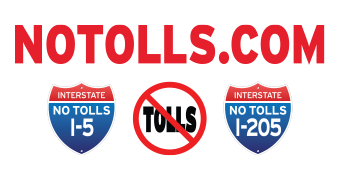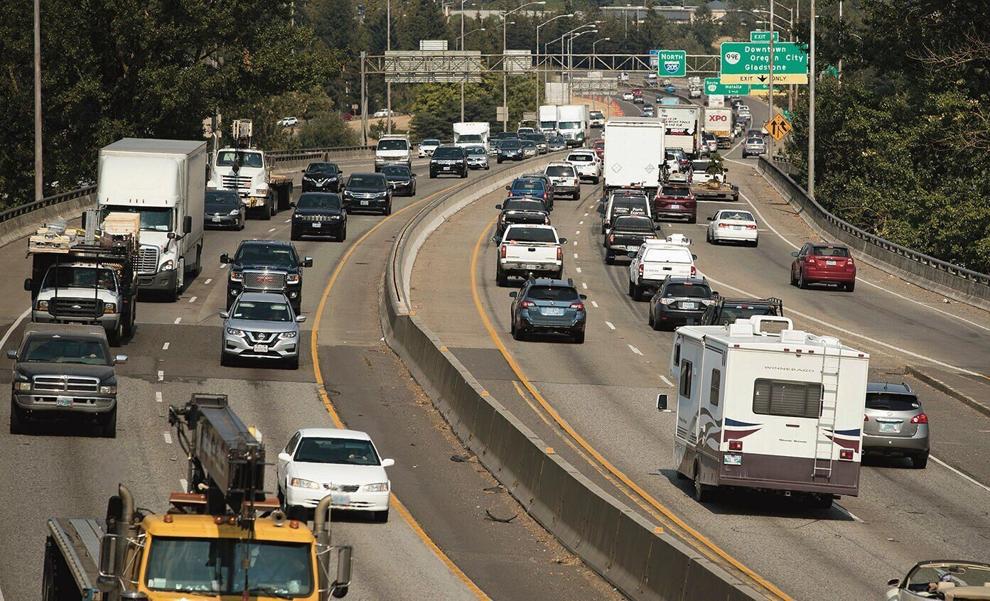Polls show virtually no one wants Portland freeways tolled
By Cam Gilmour
Mar 20, 2024 Portland Tribune
In a March 11 letter to the Oregon Transportation Commission, Gov. Tina Kotek stated the “state’s path toward implementing tolling in the Portland area is uncertain, at best. Therefore, I believe it is time to bring the agency’s work on the RMPP to an end and delay additional expenditures for implementation of tolling on I-205 to the future when the legislature can further evaluate and provide clearer direction on tolling.” RMPP refers to a Federal Highway Administration program called the Regional Mobility Pricing Project.
ODOT summarizes the project as follows: “The Regional Mobility Pricing Project would toll I-5 and I-205 in the Portland metropolitan region. Tolling is part of ODOT’s long-term strategy to help pay for transportation improvements and provide faster, more efficient trips through the Portland metro region.”
Many of ODOT’s projects statewide are over budget and revenue forecasts show gas-tax collections declining in future years. Combined with construction costs that have nearly doubled since 2020, sending tolling back to the Legislative Assembly is overdue.
Public meetings and polls show no one wants to pay four bucks to cross a freeway bridge. That was the plan for the I-205 Abernethy Bridge whose reconstruction will be finished in 2025. Who running for office will want to defend tolling when many freeway users are hurting financially? Moreover, polls show virtually no one wants Portland freeways tolled.
Could the governor’s yellow light on tolls be a step to take tolling out of election debates this year and in 2026, a gubernatorial election year? Could it be that tolls will happen in 2027 should the legislature repeat what was done in 2017, when tolling as a source of new revenue and a 10 cent gas tax increase was approved?
ODOT’s funding strategy now assumes increased use of electric vehicles and plug-in electrics will reduce gas taxes as its main source of state revenue (shared with cities and counties). Revenue forecasts indicate that in the 25-27 biennium there will be less gas tax collections than in the current biennium. These forecasts are based on electric-vehicle sales data, and the state’s Environmental Quality Commission mandating all new car sales be electric or hydrogen powered vehicles as of 2035.
Recent reports say electric vehicle sales are declining and sales of hybrid electric vehicles are on the rise. How will all of this pan out by 2035? Will internal combustion and diesel engines become obsolete? Will the public eventually favor tolls that could cost a typical vehicle owner thousands of dollar each year instead of the hundreds of dollars they now pay with the gas tax? Or will there be a transition to road user charges known as vehicle miles traveled taxes to replace revenue lost due to less gasoline and diesel being sold?
Visit the ODOT website and take a look their Urban Mobility Strategy and Strategic Funding Plan. Will tolls discourage car and truck trips and encourage more use of public transit, bike lanes and pedestrian paths? I doubt many freeway users will find these alternatives practical.
Taking up tolling and ODOT’s funding issues by the Legislative Assembly in 2025 will hopefully be more than a delay tactic. It is the legislature’s responsibility to get ODOT’s funding on the right track and not leave it at the train depot.
Tolling infrastructure is expensive to build, operate and maintain. Tolls harm personal budgets and take money out of the local economy as individuals and businesses have less money to spend or save. Tolls divert traffic to roads and streets not designed to handle this unwanted traffic. Polls show the public does not want tolling.
Transitioning to road user charges to augment — not replace — the gas tax looks like a fair and equitable alternative to tolls. Maybe the legislature will agree and do the right thing and permanently sideline tolls on Portland-area freeways.
Cam Gilmour is retired from serving as ODOT’s deputy director of finance and administration, Clackamas County’s director of transportation and development and the state of Washington’s transportation department’s chief operating officer.



One comment
Mark Lombardi
March 25, 2024 at 4:42 pm
After having read this very informative article, I maintain my stance as a citizen, and native Oregonian.
I will NEVER pay for infrastructure of any kind, with the exception of Oregon’s already implemented gas tax, for the purpose of bettering infrastructure that I’m already, or have already, paid for, and continue to pay for as a homeowner who already pays exorbitant taxes. I understand the ramifications of a plan that is hated. I’ll never pay for the roads I’ve already paid for. Period.